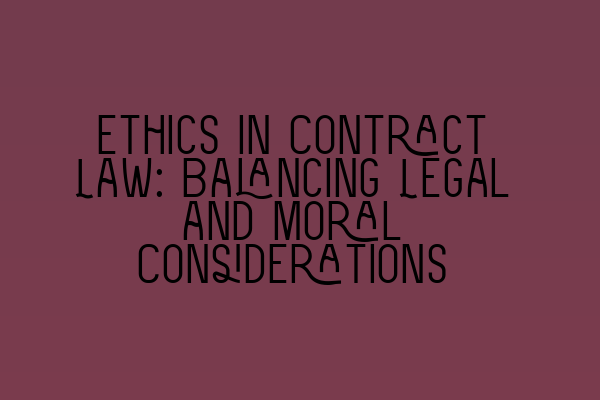When it comes to contract law, the focus is typically on the legal aspects of the agreement. However, it’s important to remember that contract law is not just a matter of legalities; there are ethical considerations that should also be taken into account. In this blog post, we will explore the concept of ethics in contract law and the need to balance legal and moral considerations.
The Role of Ethics in Contract Law
Contracts are formal agreements between parties, outlining their rights and obligations. While the law governs these agreements, ethical considerations play a crucial role in shaping the conduct of the parties involved.
Contracts should not only be legally enforceable, but they should also be fair, just, and ethical. The principles of honesty, integrity, and fairness should guide both the drafting and execution of contracts.
When drafting a contract, it is important to ensure that the terms and conditions are clear, unambiguous, and not misleading. Parties should have a complete and accurate understanding of what they are agreeing to. It is unethical to include hidden clauses or use ambiguous language to exploit the other party.
Similarly, during the execution of a contract, parties must act in good faith. They should comply with their contractual obligations, perform their duties diligently, and avoid any actions that could harm the other party. Breaking promises, engaging in deceptive practices, or backing out of a contract without valid reasons are all unethical behaviors.
Now let’s explore the ways in which we can balance legal and moral considerations in contract law.
Preserving Ethical Considerations in Contract Drafting
When drafting a contract, it is important to strike a balance between legal enforceability and ethical considerations. While the law provides guidelines for contract formation, parties should go beyond mere legal compliance to ensure ethical conduct.
One way to achieve this balance is by using clear and straightforward language. Avoiding complex jargon and convoluted clauses promotes transparency and ensures that all parties have a fair understanding of their rights and responsibilities.
Additionally, it is important to consider the impact of the contract on third parties. While the law primarily focuses on the rights and obligations of the contracting parties, ethical considerations may require us to consider the potential effects on others.
For instance, a contract involving the sale of products that may harm the environment could be legal, but it may raise ethical concerns. Taking into account the well-being of stakeholders, such as the community or the environment, can help balance legal and moral considerations.
Furthermore, contracts should include mechanisms for dispute resolution that are fair and ethical. Parties should have access to alternative dispute resolution methods, such as mediation or arbitration, which can help resolve conflicts in a less adversarial and more ethical manner.
Enforcing Ethical Conduct in Contract Execution
Once a contract is in effect, enforcing ethical conduct becomes crucial. While the law provides remedies for breach of contract, parties should also strive to maintain the highest ethical standards in their interactions.
Open and honest communication between parties is key. If one party is facing difficulties meeting their contractual obligations, it is important to engage in timely and transparent discussions to find a mutually acceptable solution.
Parties should also respect the principle of good faith. This means that they should act honestly and not take unfair advantage of the other party’s vulnerabilities. Good faith includes performing obligations diligently, cooperating in the fulfillment of the contract, and avoiding conduct that could undermine the purpose of the agreement.
Furthermore, parties should be mindful of the long-term relationship that is often established through a contract. Even after the completion of the contract, ethical conduct can contribute to the preservation of a positive business reputation and future opportunities.
Conclusion
Ethics should not be an afterthought in contract law; they should be an integral part of the entire process. By balancing legal and moral considerations, we can create contracts that are not only enforceable but also fair, just, and ethical.
To explore more topics related to contract law, check out our related articles:
- Interpreting Contractual Clauses: Unlocking the Hidden Meanings
- Contract Law Tutorials: Simplifying Complex Concepts for Students
- Discharge of Contracts: Modes and Consequences Explained
- Exploring Third Party Rights in Contract Law: Implications and Boundaries
- Contractual Obligations: Navigating the Responsibilities of Parties
Remember, a well-drafted and ethically sound contract not only protects your legal interests but also contributes to a fair and just society.
